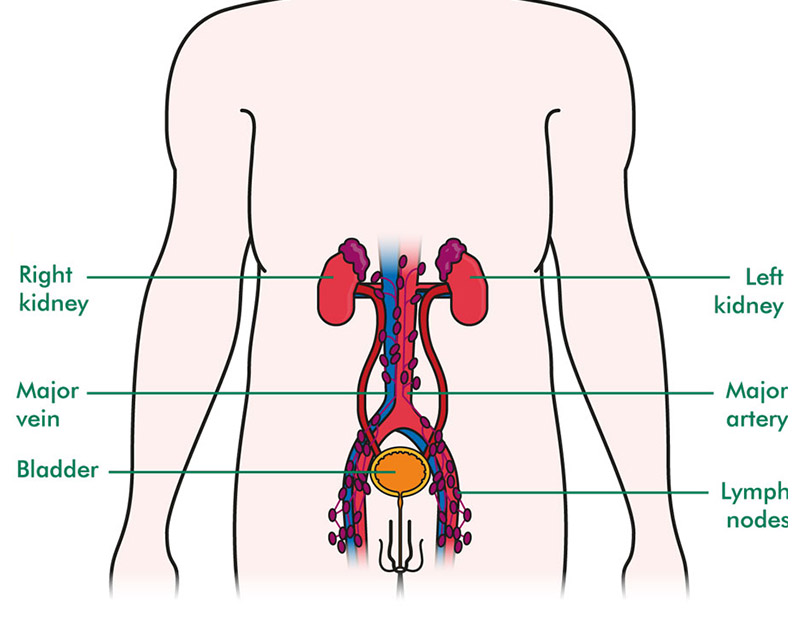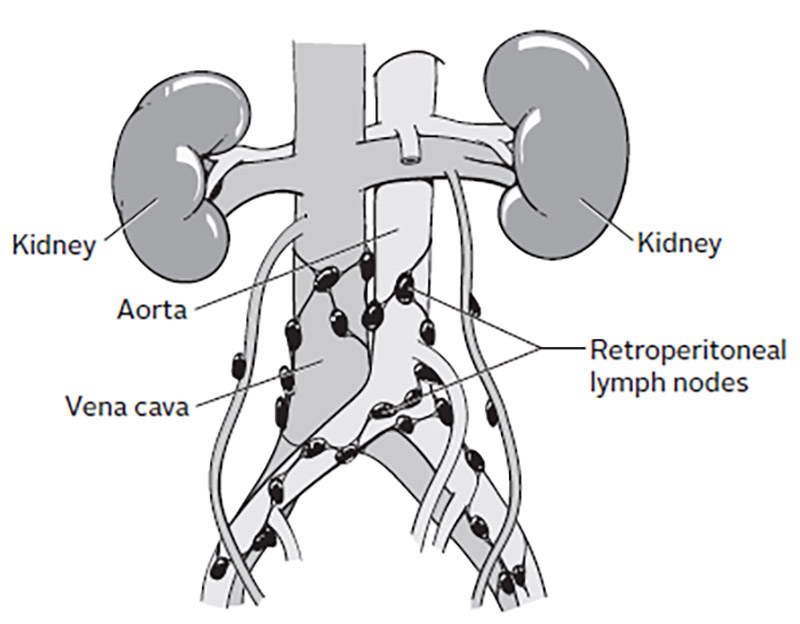An Overview of Retroperitoneal Lymph Node Dissection
An Overview of Retroperitoneal Lymph Node Dissection

Here is an overview of retroperitoneal lymph node dissection – also known as RPLND or lymphadenectomy – including a rundown of the procedure, recovery process, and possible side effects.
Retroperitoneal lymph node dissection – abbreviated as RPLND or known as a lymphadenectomy – is a surgical procedure to remove cancerous abdominal lymph nodes to treat testicular cancer.
Testicular cancer is known to spread in a pattern and lymph nodes in the retroperitoneum are a primary landing site during advancement of the disease. However, not all patients with testicular cancer need to have their lymph nodes removed – only when they contain cancerous cells. Your urologist will discuss this with you.
Retroperitoneal lymph node dissection may also be used to help determine what stage the cancer is in; by dissecting the and examining the removed lymphatic tissue your urologist can determine the extent of any malignant disease and thus gain a more accurate insight into the extent of the cancer.
Procedure
Retroperitoneal lymph node dissection requires general anesthesia. The procedure may either be performed as open surgery or laparoscopically.
Open surgery – During open surgery, your urologist will make an incision from the sternum, down the midline of the abdomen to below the navel. From here your surgeon can move aside your organs to access the lymph nodes for the removal of the cancerous tissue. Additionally, the blood supply to the affected testicle and spermatic cord are removed.
Laparoscopic retroperitoneal lymph node dissection – Laparoscopic surgery is far less invasive than open surgery. Several small incisions are made in the abdomen. From here small instruments are inserted to remove the lymph nodes. This procedure is also often used for patients with early stage non-seminomas to see if the lymph nodes are also cancerous.
Recovery
Following the procedure, patients are taken to recovery and monitored closely. A catheter is usually placed into the urethra to help monitor your urine after surgery. This will removed after 2-4 days.
Pain and numbness at the incision site is common for a period after the surgery. Recovery times will be different for each patient and the procedure. Patients who have had laparoscopic surgery will usually require a shorter stay in hospital. Those who have had open surgery will usually need to stay for 7-10 days.
While in hospital, breathing exercises are encouraged to help prevent respiratory infections and complications like pneumonia. Walking a few times per day is advised in the days immediately following surgery to help prevent pneumonia and blood clots in your legs.

Once home, patients should rest but try to keep active in small doses. Walking is still encouraged 4-6 times a day, however, heavy lifting or strenuous activity is discouraged for up to 4 weeks following surgery (again the type of surgery will determine the recovery rate – laparoscopic surgery will mean a faster recovery rate).
Driving is not recommended while the patient is still taking medication and until full range of motion in the waist is retained. Most patients will be able to return to work 4-8 weeks after surgery.
Based on the pathology report from the surgery, further treatment may be required to treat the testicular cancer such as chemotherapy.
Risks and Side Effects
As with any major surgery, there are risks involved with a retroperitoneal lymph node dissection including bleeding at the surgical site, infection and damage to proximal organs or tissue, however these complications are rare.
Possible side effects include problems with fertility and ejaculation. Retrograde ejacuation may occur; this is where the delicate nerves responsible for the control of ejaculation are damaged during the surgery resulting in reversed ejaculation into the bladder rather than through the penis. This is can have an adverse effect on a man’s ability to father children.
Lymphocele may also occur. This is where lymphatic fluid collects in the area where the lymph nodes were removed, which may require drainage of the fluid or further surgery.
Retroperitoneal Lymph Node Dissection With Urology Specialist
Dr Arianayagam is an expert in the field urological cancer surgery, including robotic surgery and laparoscopic surgery for the treatment of testicular cancer and retroperitoneal lymph node dissection.
If you have any further questions about testicular cancer or retroperitoneal lymph node dissection and would like to book an appointment, please feel free to call.

Everything You Need to Know About Sperm Health
It is not uncommon for men to have troubles with their sperm production, or to develop a sperm disorder. But…

The Benefits of Drinking Water for Urological Health: Do You Really Need 8 Glasses a Day?
We’ve all heard the advice: “Drink eight glasses of water a day” But is this rule as important as it…






